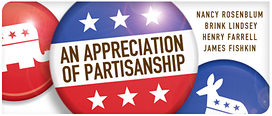Henry argues that my criticisms of partisanship are valid enough, but that the vices I identify (ideological blinkers, differing standards of judgment for comrades and rivals) aren’t specific to party ID. I agree completely! The problems I discuss go to basic aspects of the human condition: namely, confirmation bias on the one hand and ingroup loyalty/outgroup hostility on the other. Partisanship of one kind or another is absolutely inescapable: we are all partisans of the ideas we currently hold to be true and the values we cherish, and we are all more partial to some people than others.
We cannot eliminate this natural human partiality, but we ought to wrestle with it. We ought to care about the truth and entertain a healthy doubt that we are currently in secure possession of it; we ought to be able to step outside our narrow affiliations and take a larger view. As Nancy Rosenblum points out, political parties do push back against partiality — internally. They do facilitate internal deliberation; they do encourage narrow factions to see the larger party interest. But externally, vis à vis other parties, it’s a totally different story. Parties exist to mobilize coalitions in competitions for political power. It is therefore in their DNA to drum up enthusiastic (i.e., uncritical) support for the cause and us-versus-them groupthink. Those are not activities that I find worth celebrating. In particular, when natural human partiality is scaled up to the level of mass action, and when the whole point of that mass action is to grab the levers of coercive power, I don’t see how anyone with liberal instincts can view the resulting spectacle without at least an occasional shudder of revulsion.
I think perhaps Henry misunderstands the nature of my antipartisanship. I don’t oppose the existence of political parties, and I don’t have any alternatives to suggest. I even agree that they have a real upside, as Nancy has so ably demonstrated. But the plain fact is that partisanship is riddled with intellectual and moral vices, and somebody needs to point that out. If there is a necessary and appropriate role for partisans to keep the democratic system chugging along, surely there is also a place for antipartisans to keep political zeal in check by pointing out its squalid and sometimes dangerous excesses.

